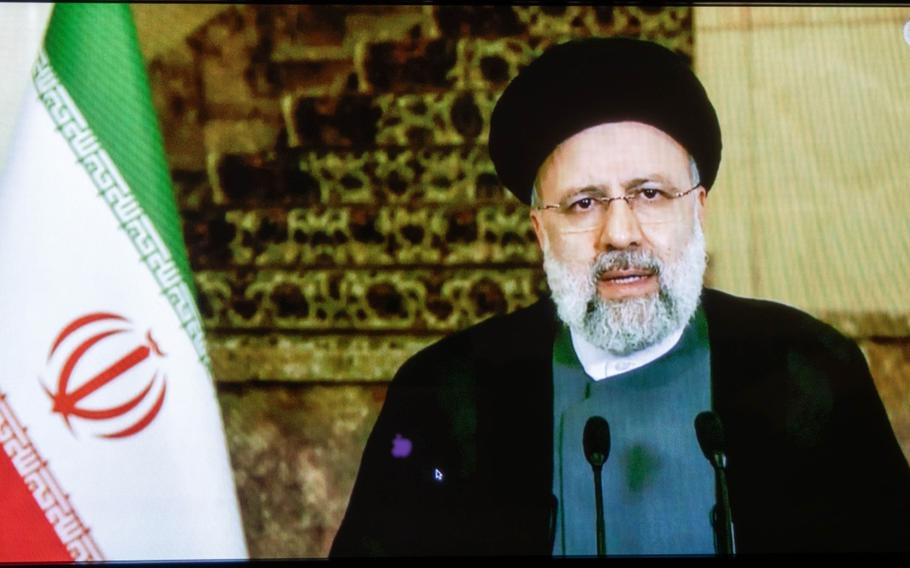
Ebrahim Raisi, Iran’s president, in pre-recorded video at the United Nations General Assembly in New York on Sept. 21, 2021. (Michael Nagle/Bloomberg)
Iran President Ebrahim Raisi, in his first U.S. media interview, said that the Biden administration’s promise to adhere to a new nuclear agreement was “meaningless” without guarantees that the United States would not again unilaterally withdraw from the deal in the future.
“If it’s a good deal and fair deal, we would be serious about reaching an agreement. It needs to be lasting,” said Raisi, speaking through an interpreter in an interview with CBS’s “60 Minutes,” conducted last week in Tehran and broadcast Sunday evening. But he added: “We cannot trust the Americans because of the behavior that we’ve already seen from them. That is why if there is no guarantee, there is no trust.”
Tehran’s demand for guarantees that the United States would stay in a new agreement has become a principal sticking point in the failure of Iran and world powers to negotiate a deal to replace the 2015 version from which the Trump administration withdrew in 2018. Negotiations that began nearly a year and a half ago have now sputtered to a virtual stop.
Administration negotiators have made clear from the beginning of the talks, which include Britain, France, Germany, Russia and China — all signers of the original deal, along with the United States and Iran — that no U.S. administration has the power to bind the actions of its successor.
Since July, when European Union foreign policy chief Josep Borrell, whose office has coordinated the talks, sent Tehran and Washington what he called a “final text” of every issue that had been successfully negotiated, the two capitals have exchanged two rounds of responses without reaching agreement. No additional talks are scheduled.
Raisi, elected in June 2021 and widely considered a hard-liner, said that there would be no benefit in meeting with President Biden — something the White House has not expressed interest in — when both leaders attend the U.N. General Assembly this week. “The new administration in the U.S., they claim that they are different from the Trump administration,” he said. He added: “But we haven’t witnessed any changes in reality.”
Biden campaigned on a pledge that he would restore the original nuclear deal with Iran, which lifted nuclear-related sanctions in exchange for sharp restrictions on Iran’s nuclear program, along with international monitoring and verification. After withdrawing from what he called a “bad deal” negotiated by his predecessor, Barack Obama, Trump reimposed the lifted sanctions and added more for what he called “maximum pressure” that would cause Iran to capitulate.
Instead, Iran has gone far beyond the limits imposed by the agreement, increasing the quantity and quality of enriched uranium that is necessary to build a nuclear weapon. Iran has repeatedly said it has no intention of developing such a weapon. Raisi said Iran’s nuclear program is intended for medical and agricultural use.
As the possibility of a new deal has become increasingly doubtful, the administration has added to the list of sanctions against Iran, while attacks against U.S. interests in Syria and Iraq that it charges are the work of Iranian proxies have increased. Iran has worked to circumvent U.S. sanctions by exporting much of its oil to China, and selling weapons to Russia — including what the United States have said are weaponized drones being used in Ukraine.
Raisi said that Iran was “not going to forget” the January 2020 assassination of Qasem Soleimani of Iran’s Islamic Revolutionary Guard Corps, who was killed by a U.S. drone strike. Calling it a “heinous crime,” he said that “we want justice to be served.”
Last month, the Biden administration indicted an Iranian national with alleged ties to the Revolutionary Guard. The government accused the Iranian, charged in absentia, with funding a plot to assassinate former Trump national security adviser John Bolton. Asked whether his government had ordered Bolton’s assassination in retaliation for the Soleimani killing, Raisi said: “That’s the type of the actions that the Americans and Zionist regimes are doing in the world. We are not going to carry out the same actions.”